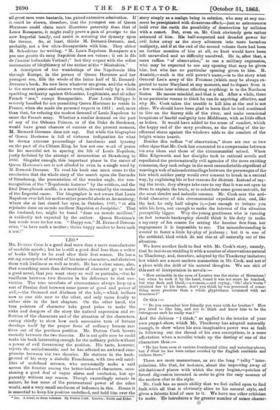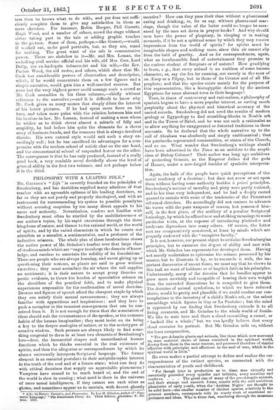LEO.*
Mn. DUTTON COOK is a good deal more than a mere manufacturer of readable novels; but he is still a good deal less than a writer of books likely to be read after their first season. He has a strong conception of several of his minor characters, and sketches them with liveliness as well as truth. He has a clear sense, also, that something more than delineations of character go to make a good novel, that you want story as well as portraits,—but he vacillates between two theories in his deference to that con- viction. The true novelists of circumstance always keep up a sort of Persian duel between some power of good and power of evil,—the Oromasd and Ahriman of the tale,—which inclines now to one side now to the other, and only turns finally to either side in the last chapters. On the other hand, the true painters of character take great pains to make the risks and dangers of the story the natural expression and re- flection of the characters and of the situation of the characters, caring chiefly to show how each successive turn of fortune develops itself by the proper force of ordinary human mo- tives out of the previous position. Mr. Dutton Cook hovers uneasily between the two theories. He is not quite sure he could make his book interesting enough for the ordinary public without a power of evil threatening the position. His taste, however, rejects the melodramatic, and be has affected an awkward com- promise between the two theories. He stations in the back- -ground of his story a diabolic Frenchman, with two evil satel- lites of undefined menace, who occasionally make a raid across the frontier among the better-behaved characters, occa- sioning a good deal of vague alarm and confusion, but ap- parently without any reason. Though exceedingly satanic in nature, he has none of the preternatural power of the other world, and a very small modicum of influence in this. Hence it is essential to keep his position undefined, and hold him over the • Leo. A novel, lu three volumes. By Dutton Cook. London ; Smith and Elder. story simply as a malign being in solution, who may at any mo- ment be precipitated with disastrous effeet,—just as astronomers hold over the earth the possibility of destruction by collision
with a comet. But, even so, Mr. Cook obviously gets rather ashamed of him. His half-suspected and dreaded power for evil fades away as the story advances into mere harmless malignity, and if at the end of the second volume there had been no further mention of him at all, no knot would have been left unravelled and no difficulty unsolved. He is, after that, a mere ruffian " of observation," to use a military expression, who may be expected to use any opening that may be given him, but who has no particular opening given to him. M. Anatole,—such is the evil power's name,—is to the story what General Lee's army of the Potomac (which may be always ex- pected to enter Maryland at any moment, and to depart from it a few weeks later without effecting anything) is to the Northern States. He means mischief, and that is all. After a while, there is no particular reason to think he can do anything effective, and why Mr. Cook takes the trouble to kill him at the end is not clear. We should have been glad to learn that he had continued to live on the Surrey aide of the river, and make occasional irruptions of fearful malignity into Middlesex, with as little effect as before. It would have added to the sense of comfort, which the happy end of the story produces, as the dashing of the in- effectual storm against the windows adds to the comfort of the bright winter hearth.
Besides this ruffian " of observation," there are one or two
other signs that Mr. Cook has consented to a compromise between his own ideas and those of the circumstantial school. When Miss Edgeworth and her disciples took to rational novels and
repudiated the preternaturally evil agencies of the more exciting romances, they took refuge in the most uncomfortable expedient of weavings web of misunderstandings between the personages of the tale which neither party would ever consent to break in a natural way, by explaining his or her reasons for distrust. Instead of say- ing the truth, they always take care to say that it was not open to them to explain the truth, or to substitute some gross untruth, for the most slender and imbecile reasons. Mr. Cook sees the arti- ficial character of this circumstantial expedient also, and, like the last, he only half adopts it,—just enough to irritate you with his hero, not enough to make the interest of the situation perceptibly bigger. Why the young gentleman who is running on fast towards bankruptcy should think it his duty to make a mystery of his reason for setting the heroine free from her engagement it is impossible to see. The misunderstanding is
wanted to foster a little by-play of jealousy ; but it is one of the artificial, kind which do not rise at all naturally out of the situation.
We have another fault to find with Mr. Cook's story, namely, that he insists on studding it with a number of observations natural to Thackeray, and, therefore, adopted by the Thackeray imitators; but which are a mere modern mannerism in Mr. Cook, and not of a piece with the drift of his natural thoughts. We are sick of this sort of interpolation in novels:-
" How estimable in the eyes of Leontes was the statue of Hermione ! but when he took it by the hand, found it was not stone he touched, but true flesh and blood,—a woman,—and crying, Oh! she's warm !' strained her to his heart, don't you think he was possessed of some- thing more precious than a whole glyptotheca crammed with art treasures?"
Or this :—
" ' Do you remember how friendly you were with her brother ? How you tried to like him, and not to think and know him to be the outrageous snob he really was ?' "
And the dubious " I think," as applied to the interior of your own puppet-show, which Mr. Thackeray has adopted naturally enough, to show where his own imaginative power was at fault in following out the thread of his own conceptions, is a mere affectation when a novelist winds up the destiny of one of the characters thus :—
He has been seen at various Continental cities and watering-places, but I think he has been rather avoided by the English residents and visitors there."
These are mere mannerisms, as are the long " talky " inter- polations, like that, for instance, about the improving away of old-fashioned places with which the story begins,—patches of forced digression invented in order to give the easy manner of
the modern chat to the style.
Mr. Cook has so much ability that we feel called upon to find fault with all that is obviously alien to his natural style, and gives a falsetto kind of ease to it. We have one other criticism to make. 'He introduces a far greater number of minor charac- tors than ho knows what to do with, and yet does not suffi- ciently complete them to give any satisfaction in them as mere sketches. For instance, Robin Hooper, Phil Gossett, Hugh Wood, and a number of others, crowd the stage without either taking part in the tale or adding graphic touches to the picture. Some of them, perhaps,—like Gossett,—would, if worked out, mike good portraits, but, as they are, stand for nothing. The great want of the tale is concentrative power. There are sketches in it—Mr. and Mrs. Lomax, the swindling civil service official and his wife, old Mrs. Carr, Lord Dolly, the ex-harlequin tobacconist and his wife,—the Rev. Puiton Wood, the old rector, and others, which show that Mr. Cook has considerable powers of observation and description, which, if he would concentrate them on a few figures and a simple narrative, would gain him a well-merited success. But none but the very highest power could manage such a crowd as Mr. Ccok assembles in his three volumes,—chiefly without reference to the narrative ;—and it is difficult to know why Mr. Cook gives so many scenes that simply dilute the interest of his better pictures. If he had spent more force on his hero, and taken more pains with the relation between him and his brother-iu-law, Mr. Lomax, instead of making a man whom he wishes us to think clever almost a miracle of folly and stupidity, he had before him quite the elements for a clever story of business frauds, and the romance that is always involved therein. His own natural style would snit such a story ex- ceedingly well ; but he has sacrificed its advantages for a com- promise with the modern school of satiric chat on the one hand, and the circumstantial school of suspended horror on the other. The consequence is that he has only produced, instead of a really good book, a very readable novel decidedly above the level of general ability in the first two volumes, and not perhaps below it in the third.































 Previous page
Previous page